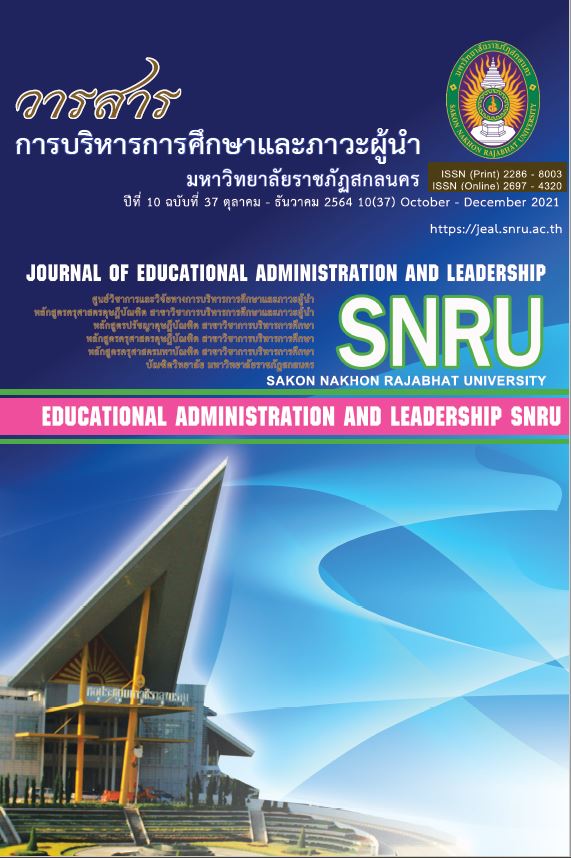

รูปแบบการพัฒนาสมรรถนะครูรองรับการศึกษายุค 4.0
Model Development of Teacher Competencies for Education 4.0
ผู้แต่ง
พรศักดิ์ สุจริตรักษ์, ชนิตา พิลาไชย
Author
Phornsak Sucharitrak, Chanita Pilachai
บทคัดย่อ
การวิจัยครั้งนี้มีวัตถุประสงค์เพื่อศึกษา 1) สมรรถนะครูรองรับการศึกษายุค 4.0 2) รูปแบบการพัฒนาสมรรถนะครูรองรับการศึกษายุค 4.0 และ 3) ยืนยันความเป็นไปได้ ความเป็นประโยชน์ ความถูกต้องครอบคลุมของรูปแบบการพัฒนาสมรรถนะครูรองรับการศึกษายุค 4.0 กลุ่มตัวอย่างที่ใช้ในการวิจัย คือ โรงเรียนสังกัดสำนักงานเขตพื้นที่การศึกษาประถมศึกษาจังหวัดราชบุรี และสมุทรสงคราม จำนวน 196 โรงเรียน ได้มาโดยการเปิดตารางกำหนดขนาดกลุ่มตัวอย่างของเครจซี่และมอร์แกน จากนั้นทำการสุ่มแบบแบ่งชั้นโดยใช้สังกัดเขตพื้นที่เป็นชั้น โดยมีผู้ให้ข้อมูลโรงเรียนละ 5 คน ประกอบด้วย ผู้อำนวยการโรงเรียน 1 คน และครูผู้สอนจำนวน 4 คน รวมทั้งสิ้น 784 คน เครื่องมือที่ใช้ในการเก็บรวบรวมข้อมูลได้แก่ แบบสอบถามความคิดเห็น และแบบตรวจสอบรายการเพื่อยืนยันรูปแบบ สถิติที่ใช้ในการวิเคราะห์ข้อมูล ได้แก่ การแจกแจงความถี่ ค่าร้อยละ ค่าเฉลี่ย ส่วนเบี่ยงเบนมาตรฐาน และการวิเคราะห์ปัจจัยเชิงสํารวจ
ผลการวิจัย พบว่า
1. สมรรถนะครูรองรับการศึกษายุค 4.0 มีจำนวน 7 สมรรถนะหลัก 122 สมรรถนะย่อย ดังนี้ 1) ด้านหลักสูตรและเนื้อหาวิชา มี 8 สมรรถนะย่อย 2) ด้านการจัดการเรียนการสอน มี 26 สมรรถนะย่อย 3) ด้านการพัฒนาตนเองและเทคโนโลยี มี 48 สมรรถนะย่อย 4) ด้านคุณธรรม จริยธรรมมี 9 สมรรถนะย่อย 5) ด้านความสัมพันธ์กับชุมชนและการมีส่วนร่วม มี 11 สมรรถนะย่อย 6) ด้านการให้ความสำคัญกับผู้เรียน มี 16 สมรรถนะย่อย และ 7) ด้านการจัดสภาพแวดล้อมการเรียนรู้ มี 4 สมรรถนะย่อย
2. รูปแบบการพัฒนาสมรรถนะครูรองรับการศึกษายุค 4.0 ประกอบด้วย 7 ด้านดังนี้ 1) กิจกรรมเพื่อพัฒนาศาสตร์การสอน 2) การนิเทศ และติดตามผล 3) การใช้เทคโนโลยีเพื่อพัฒนาการเรียนรู้ 4) การแสวงหาและพัฒนาตนเอง 5) การสร้างเครือข่าย ทีมงาน และความร่วมมือ 6) การเสริมแรง และ 7) การเปลี่ยนบทบาท
3. ผลการยืนยันรูปแบบการพัฒนาสมรรถนะครูรองรับการศึกษายุค 4.0 ผู้ทรงคุณวุฒิมีความเห็นสอดคล้องกันว่ามีความเป็นไปได้ ความมีประโยชน์ และความถูกต้องครอบคลุม
Abstract
The purposes of this research were to 1) explore the teachers' competencies for education 4.0; 2) find out the model development of teachers' competencies for education 4.0; 3) examine the confirmatory of model development in terms of possibilities, usefulness, correctives which covered the teachers' competencies for education 4.0. The sample consisted of the 196 schools under the Primary Education Area office in Ratchaburi and Samut-Songkram. Krejcie & Morgan was used to estimate the sample size. The stratified random sampling was given a particular sample, five informers for each school; 1 school director and 4 teachers were selected, with 784 informers in total. The instruments in this research were open-ended questionnaires, and checklists. The statistical procedures used were descriptive statistics and Exploratory Factor Analysis.
The results can be concluded as follows:
1. The teachers' competencies for education 4.0 composed of 4 major elements and 122 minor elements as follows: curriculum and course description, which consisted of 8 minors; 2) teaching and learning include 26 minors; 3) self-development and technology with 48 minors; 4) morals and ethics with 9 minors; 5) community relationship and participation with 11 minors; 6) Learners' concentration and focus; and; 7) environmental learning management with 4 minors.
2. The model development of teachers' competencies for education 4.0 was as follows; 1) science of teaching development activities; 2) supervision and follow-up; 3) technology learning development uses: 4) searching for and self-development; 5) networking building, team and cooperation; 6) enforcement and: 7) changing roles.
3. The experts agreed on the confirmatory model's development of teachers' competencies for education 4.0 that was appropriate, practical, covered, and valuable.
คำสำคัญ
รูปแบบการพัฒนาสมรรถนะครู, การศึกษายุค 4.0Keyword
Model Development of Teacher Competencies, Education 4.0Notice: Undefined variable: dataSet in /var/www/html/ArticleView.php on line 116
Notice: Trying to access array offset on value of type null in /var/www/html/ArticleView.php on line 116
บทความทุกบทความเป็นลิขสิทธิ์ของ
Notice: Undefined variable: dataSet in /var/www/html/ArticleView.php on line 116
Notice: Trying to access array offset on value of type null in /var/www/html/ArticleView.php on line 116
เท่านั้น
กำลังออนไลน์: 8
วันนี้: 48
เมื่อวานนี้: 8,080
จำนวนครั้งการเข้าชม: 1,267,731
อาคารบัณฑิตวิทยาลัย ชั้น 2 ตำบลธาตุเชิงชุม อำเภอเมือง จังหวัดสกลนคร 47000
โทร/
แฟกซ์ 0-4297-0093
บรรณาธิการ: รองศาสตราจารย์ ดร.ไชยา ภาวะบุตร
ติดต่อ/สอบถาม: นายธีรเวทย์ เพียรธัญญกรณ์
โทร: 0-4297-0093